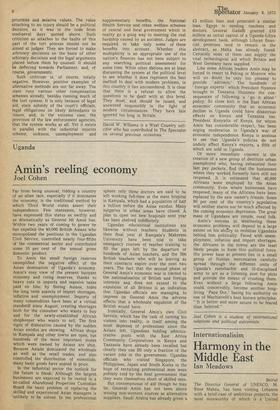Uganda
Amin's reeling economy
Joel Cohen
Far from being unusual, ridding a country of an alien race, especially if it dominates the economy, is the traditional method by which Third World states assert their independence. Few statesmen, however, have expressed this status as swiftly and as dramatically as General Idi Amin has. Within two years of coming to power he has expelled the 40,000 British Asians who monopolised the positions in the Ugandan Civil Service, controlled nearly four-fifths of the commercial sector and contributed some 10 per cent of the annual gross domestic product.
To Amin the small foreign reserves exemplified the negative effect of the Asian domination of Uganda's economy. Amin's rosy view of the present buoyant economy and rising reserves, thanks to heavy cuts in imports and massive taxes paid en bloc by fleeing Asians, hides the long term aspects of import shortages, inflation and unemployment. Imports of many commodities have been at a virtual standstill since August, creating shortages both for the consumer who wants to buy and for the newly-established African shopkeeper who wants to sell. The first signs of dislocation caused by the sudden Asian exodus are showing. African shops in Kampala and other towns are open, but hundreds of the more important stores which were owned by Asians are shut. Because Asians dominated the wholesale as well as the retail trades, and also controlled the distribution of essentials, many basic goods have soared in price.
In the industrial sector the outlook for the future is bleak. Although the largest businesses are expected to be vested in a so-called Abandoned Properties Custodian Board the basic problem of replacing the skilled and experienced Asian managers is unlikely to be solved. In the professional sphere only three doctors are said to be left working full-time at the main hospital in Kampala, which had a population of half a million before the Asian exodus. Many surgeries in urban areas have closed. A plan to open ten new hospitals next year has been shelved indefinitely.
Ugandan educational institutions are likewise without teachers. Students in their final year at Kampala's Makerere University have been told to take emergency courses of teacher training to fill the gaps left by the departure of hundreds of Asian teachers, and the 500 British teachers who will be leaving as their contracts expire over the next two years. The fact that the second phase of General Amin's economic war is limited to the nationalisation of British and foreign interests and does not extend to the expulsion of all Britons is an indication that Ugandan officials are managing to impress on General Amin the adverse effects that a wholesale expulsion of the British would have.
Ironically, General Amin's own Civil Service, which has the task of turning his visions into reality, is itself among the most depleted of professions since the Asians left. Ugandans holding administrative posts with the East Africa Community Corporations in Kenya and Tanzania have already been recalled but clearly they can fill only a fraction of the vacant jobs in the government. Ugandan officials who visited Singapore, the Philippines, Japan and South Korea in the
hope of recruiting professional men were .politely told by the host government that they were themselves short of skilled men.
But contemptuous of aid though he may be, General Amin has not been above wooing non-western sources as alternative suppliers. Saudi Arabia has already given a £3 million loan and promised a similar loan. Egypt is sending teachers and doctors. General Gadaffi granted £10 million as initial capital of a Uganda-Libya development bank, although Libyan financial promises tend to remain in the abstract, as Malta has already found. Certainly none of them can supply the vital technological aid which Britain and West Germany have supplied.
Like some African leaders Amin may be forced to resort to Peking or Moscow who will no doubt be only too pleased to provide 'advisers.' The hundreds of 'foreign experts' which President Nyerere brought to Tanzania illustrate the consequences of following a 'go it alone ' policy. So close knit is the East African economic community that an economic decline in Uganda could have disastrous effects on Kenya and Tanzania too. President Kenyatta of Kenya, for whom Amin has considerable respect,. has been urging moderation in Uganda's war of economic independence. Kenya is anxious to see that Uganda's policies do not unduly affect Kenya's exports, a fifth of which are sold in Uganda.
Of more immediate concern is the creation of a new group of destitute urban unemployed who, having exhausted their last pay packets, find that the businesses where they worked formerly have still not reopened. It is estimated that 40,000 Africans were employed by the Asian community. Even where businesses have reopened, many of the Africans have been replaced by the new owner's friends. Some 90 per cent of the country's population will neither starve nor be much affected by the coming economic depression. The great mass of Ugandans are simple, rural folk. Amin's success in weathering these economic problems will depend to a large extent on his abitity to mobilise Ugandans behind him politically. Faced with unemployment, inflation and import shortages, the Africans in the towns are the least likely people to form this political force. His power base at present lies in a small group of Nubian mercenaries carefully spread through the different units of Uganda's ramshackle and ill-disciplined army to act as a listening post for plots and provide the means of crushing them. Even without a large following Amin could, conceivably, become another longliving 'Papa Doc,' basing his authority on one of Machiavelli's best known principles: "It is better and more secure to be feared than beloved."
Joel Cohen is a student of international relations and political extremists.

































 Previous page
Previous page